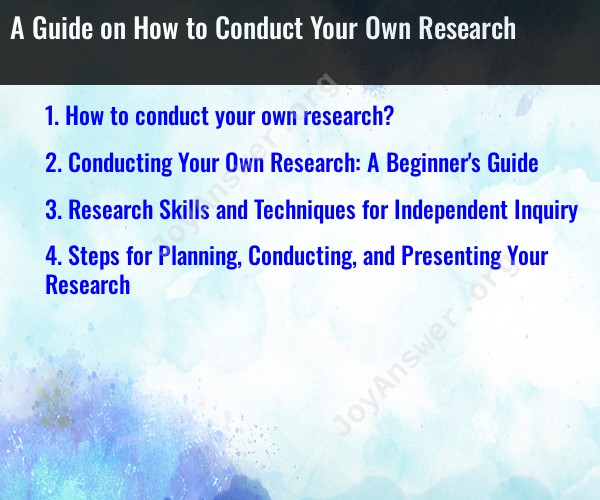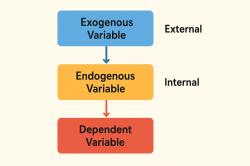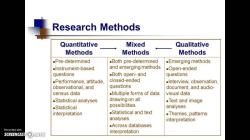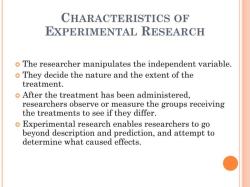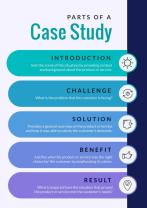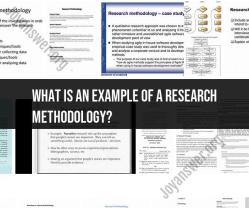How to conduct your own research?
Conducting your own research can be a rewarding and insightful process. Whether you're conducting academic research, investigating a personal interest, or working on a project, here's a guide on how to conduct your own research:
1. Define Your Research Question or Topic:
- Start by clearly defining what you want to research. What is the specific question or topic you want to explore? Ensure it is clear and focused.
2. Review Existing Literature:
- Before diving into your research, review existing literature to understand what is already known about your topic. Use academic journals, books, online resources, and databases like Google Scholar.
3. Develop a Research Plan:
- Create a research plan that outlines your objectives, methods, and a timeline. Consider what data you need to collect, how you'll gather it, and when you'll complete each phase.
4. Choose Your Research Methodology:
- Select the research methodology that best suits your research question. Common methods include surveys, interviews, experiments, content analysis, observations, and case studies.
5. Collect Data:
- Depending on your chosen methodology, gather data relevant to your research. Be systematic, organized, and consistent in collecting and recording data.
6. Analyze Data:
- After data collection, analyze it using appropriate tools and techniques. This may involve statistical analysis, content analysis, or qualitative coding, depending on your data.
7. Interpret Findings:
- Interpret the results of your analysis. What do the findings mean in the context of your research question? Are there patterns, correlations, or significant outcomes?
8. Draw Conclusions:
- Based on your interpretation of the findings, draw conclusions that address your research question. What did you learn, and how does it contribute to the existing knowledge?
9. Discuss Implications:
- Discuss the practical or theoretical implications of your research. How might your findings be applied, and what questions or areas of study do they raise?
10. Write a Research Report or Paper:
- Document your research in a report or paper. Follow a consistent format, including an introduction, literature review, methodology, results, discussion, and conclusion.
11. Cite Sources Properly:
- Ensure you provide proper citations for all sources you used in your research. Use a citation style appropriate to your field, such as APA, MLA, or Chicago.
12. Share Your Research:
- Share your research findings with relevant audiences. This could involve presenting at conferences, publishing in journals, or sharing your work with peers and the public.
13. Seek Feedback:
- Don't hesitate to seek feedback on your research from mentors, colleagues, or advisors. Constructive criticism can help you refine your work.
14. Revise and Refine:
- After receiving feedback, revise and refine your research. Address any shortcomings or areas for improvement.
15. Reflect and Learn:
- Reflect on your research process. What did you learn about conducting research, and how might you approach future research projects differently?
Remember that research can be a complex and time-consuming endeavor. Take your time, stay organized, and be open to adjusting your approach as you progress. It's also essential to maintain ethical standards, including obtaining proper permissions and respecting privacy when conducting research involving human subjects.
Conducting Your Own Research: A Beginner's Guide
Research is the process of gathering and analyzing information to answer a question or solve a problem. It can be conducted in a variety of ways, including through surveys, experiments, interviews, and data analysis.
Here is a beginner's guide to conducting your own research:
- Identify your research question or topic. What do you want to learn more about? What problem are you trying to solve?
- Conduct a literature review. This involves reading and summarizing existing research on your topic. This will help you to identify any gaps in the research and to develop your own research questions.
- Develop a research plan. This should include your research question, your methodology, and your timeline.
- Collect your data. This may involve conducting surveys, experiments, interviews, or data analysis.
- Analyze your data. This involves looking for patterns and trends in your data and drawing conclusions.
- Present your findings. This may involve writing a research report, giving a presentation, or publishing your research in a journal.
Research Skills and Techniques for Independent Inquiry
Here are some research skills and techniques that are essential for independent inquiry:
- Critical thinking: Critical thinking is the ability to evaluate information objectively and to draw your own conclusions.
- Problem-solving: Problem-solving is the ability to identify and solve problems.
- Research design: Research design is the process of developing a plan for collecting and analyzing data.
- Data analysis: Data analysis is the process of looking for patterns and trends in data and drawing conclusions.
- Communication: Communication is the ability to clearly and concisely communicate your research findings to others.
Steps for Planning, Conducting, and Presenting Your Research
Here is a more detailed breakdown of the steps for planning, conducting, and presenting your research:
Planning your research:
- Choose a topic. What are you interested in learning more about? What problem are you trying to solve?
- Narrow down your topic. What specific aspects of your topic do you want to focus on?
- Develop a research question. What is the main question that you want to answer with your research?
- Conduct a literature review. What research has already been done on your topic? What are the gaps in the research?
- Develop a research methodology. How will you collect and analyze your data?
- Create a timeline. When do you plan to start and finish your research?
Conducting your research:
- Collect your data. This may involve conducting surveys, experiments, interviews, or data analysis.
- Organize your data. This will make it easier to analyze and interpret your data.
- Analyze your data. Look for patterns and trends in your data.
- Draw conclusions. What do your findings mean? How do they answer your research question?
Presenting your research:
- Choose a format. How will you present your findings? Will you write a research report, give a presentation, or publish your research in a journal?
- Write your report or presentation. Be clear and concise in your writing. Use visuals to illustrate your findings.
- Practice your presentation. If you are giving a presentation, practice in advance so that you are comfortable with your material.
- Deliver your presentation. Be clear and enthusiastic in your delivery. Answer any questions that the audience may have.
By following these steps, you can conduct your own research and make a valuable contribution to your field of study.
